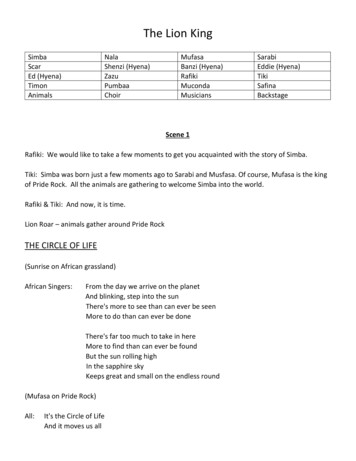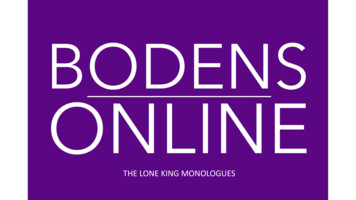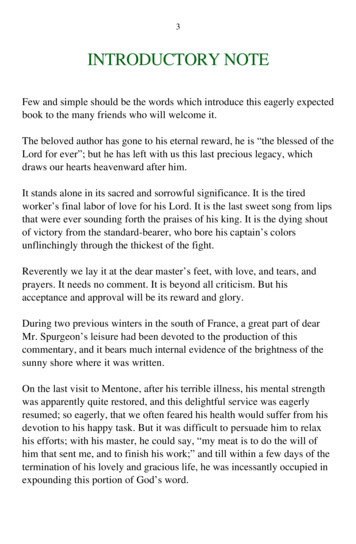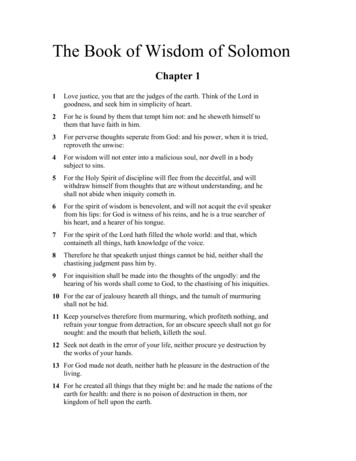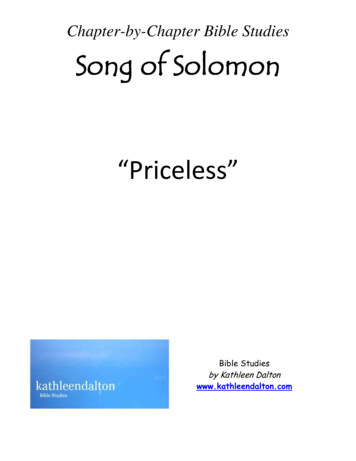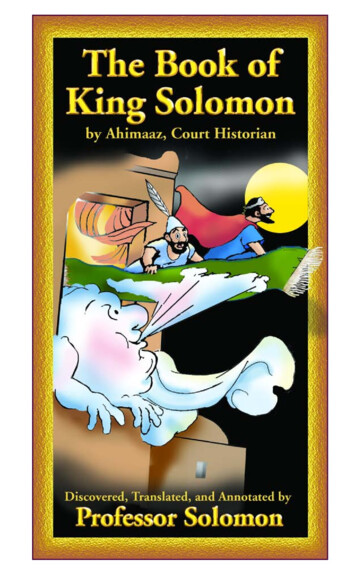
Transcription
A life of King Solomon, writtenby his court historian!Such, apparently, were the contents ofan old Hebrew manuscript, handed onto Professor Solomon by an elderlyrelative.Its brittle pages were filled with thestory of the king: his youth, his rivalsfor the throne, his accomplishmentsas ruler, his wise judgments, histhousand wives, his visits to the Caveof the Ages, his magic ring, his association with Asmodeus, his building ofthe Temple, his speaking with birds,his encounter with Goliath, Jr., hismeeting with the Queen of Sheba,his excursions on a flying carpet, hiswandering as a beggar, his finaldays.THE BOOK OF KING SOLOMON—fact or fiction? An ancientchronicle or a latter-day fabrication? A sensational find or aliterary hoax?Whatever the case, it is an engaging book—highly recommendedto anyone wanting to learn more about “the wisest of men,” hisplace in history, and his relevance today.Professor Solomon is the author of How toFind Lost Objects, Japan in a Nutshell,How to Make the Most of a Flying SaucerExperience, and Coney Island. He resides inBaltimore.www.professorsolomon.com . . .
The Book ofKing Solomonby Ahimaaz, Court HistorianDiscovered, Translated, and Annotated byProfessor SolomonIllustrated by Steve SolomonTop Hat Press
Copyright 2005 by Top Hat PressAll rights reservedISBN 0-912509-09-0http://www.professorsolomon.com
.21.22.23.24.25.Translator’s Note . . . . . . . . . . . . . . . . . . . . . . . viBathsheba . . . . . . . . . . . . . . . . . . . . . . . . . . . . . Uriah . . . . . . . . . . . . . . . . . . . . . . . . . . . . . . . . Messenger . . . . . . . . . . . . . . . . . . . . . . . . . . . . Prophet . . . . . . . . . . . . . . . . . . . . . . . . . . . . . . “Thou Art the Man!” . . . . . . . . . . . . . . . . . . . Psalm . . . . . . . . . . . . . . . . . . . . . . . . . . . . . . . Tavern Talk . . . . . . . . . . . . . . . . . . . . . . . . . . . A Son Is Born . . . . . . . . . . . . . . . . . . . . . . . . . Cave of the Ages . . . . . . . . . . . . . . . . . . . . . . . Birthday . . . . . . . . . . . . . . . . . . . . . . . . . . . . . School . . . . . . . . . . . . . . . . . . . . . . . . . . . . . . . Death Takes a Break . . . . . . . . . . . . . . . . . . . . Lie Detector . . . . . . . . . . . . . . . . . . . . . . . . . . Egg . . . . . . . . . . . . . . . . . . . . . . . . . . . . . . . . . Jar of Honey . . . . . . . . . . . . . . . . . . . . . . . . . . Gad . . . . . . . . . . . . . . . . . . . . . . . . . . . . . . . . An Altar Is Raised . . . . . . . . . . . . . . . . . . . . . . View from the Roof. . . . . . . . . . . . . . . . . . . . . “Whoa!” . . . . . . . . . . . . . . . . . . . . . . . . . . . . . Successor . . . . . . . . . . . . . . . . . . . . . . . . . . . . On the Mount. . . . . . . . . . . . . . . . . . . . . . . . Ineffable Name . . . . . . . . . . . . . . . . . . . . . . . Absalom . . . . . . . . . . . . . . . . . . . . . . . . . . . . . Map. . . . . . . . . . . . . . . . . . . . . . . . . . . . . . . . Heat . . . . . . . . . . . . . . . . . . . . . . . . . . . . . . . iii
9.60.A King Is Crowned. . . . . . . . . . . . . . . . . . . . . Deathbed. . . . . . . . . . . . . . . . . . . . . . . . . . . . Visitors . . . . . . . . . . . . . . . . . . . . . . . . . . . . . Gibeon . . . . . . . . . . . . . . . . . . . . . . . . . . . . . Tutmosa. . . . . . . . . . . . . . . . . . . . . . . . . . . . . State of the Kingdom . . . . . . . . . . . . . . . . . . . Ring . . . . . . . . . . . . . . . . . . . . . . . . . . . . . . . Manual . . . . . . . . . . . . . . . . . . . . . . . . . . . . . Trying It Out. . . . . . . . . . . . . . . . . . . . . . . . . Model . . . . . . . . . . . . . . . . . . . . . . . . . . . . . . Shamir. . . . . . . . . . . . . . . . . . . . . . . . . . . . . . Asmodeus . . . . . . . . . . . . . . . . . . . . . . . . . . . King Meets King . . . . . . . . . . . . . . . . . . . . . . Groundbreaking . . . . . . . . . . . . . . . . . . . . . . Construction . . . . . . . . . . . . . . . . . . . . . . . . . Dream . . . . . . . . . . . . . . . . . . . . . . . . . . . . . . Dedication . . . . . . . . . . . . . . . . . . . . . . . . . . Donor . . . . . . . . . . . . . . . . . . . . . . . . . . . . . . Throne . . . . . . . . . . . . . . . . . . . . . . . . . . . . . Disputed Infant . . . . . . . . . . . . . . . . . . . . . . Double Trouble . . . . . . . . . . . . . . . . . . . . . . . Suing the Wind. . . . . . . . . . . . . . . . . . . . . . . A Door Testifies . . . . . . . . . . . . . . . . . . . . . . Goliath, Jr. . . . . . . . . . . . . . . . . . . . . . . . . . . Wisdom . . . . . . . . . . . . . . . . . . . . . . . . . . . . . Otter’s Complaint . . . . . . . . . . . . . . . . . . . . . Queen of Sheba . . . . . . . . . . . . . . . . . . . . . . . Flying Carpet . . . . . . . . . . . . . . . . . . . . . . . . Mysterious Palace . . . . . . . . . . . . . . . . . . . . . Chinese Food . . . . . . . . . . . . . . . . . . . . . . . . Luz . . . . . . . . . . . . . . . . . . . . . . . . . . . . . . . . Shlomo . . . . . . . . . . . . . . . . . . . . . . . . . . . . . Ahijah . . . . . . . . . . . . . . . . . . . . . . . . . . . . . . Glimpses of the Future . . . . . . . . . . . . . . . . . A Solution . . . . . . . . . . . . . . . . . . . . . . . . . . iv
61.62.63.64.Arctic Visit . . . . . . . . . . . . . . . . . . . . . . . . . . Menelik. . . . . . . . . . . . . . . . . . . . . . . . . . . . . Retirement . . . . . . . . . . . . . . . . . . . . . . . . . . Demise . . . . . . . . . . . . . . . . . . . . . . . . . . . . . v
Translator’s NoteAunt RoseWhen she pushed aside a stack of newspapers and opened herbread box, I assumed that Aunt Rose was about to offer me a stalepastry. Instead, she extracted a bundle of brittle sheets of paper,tied with string. The topmost sheet was inscribed with Hebrewlettering. Stored in her bread box had been some sort of manuscript.“I’ve wondered what to do with this,” she said, and thrust itinto my hands.This aunt of mine—whom I was meeting for the first time—was actually a great-aunt: the widow of one of my grandfather’sbrothers. I was visiting Los Angeles; and my father—aware of myinterest in the family’s European past—had suggested that I lookher up. Hungarian-born Rose, he had pointed out, might havesome lore or anecdotes to recount. I had been warned, however,that she was “kooky.” Upon the death of her husband, for example, she had shipped Sam Solomon’s clothing, dentures, Masonicring, and taxi-driver license to my father. Also, she had a Yiddishspeaking parrot. When I heard about the parrot, I knew I had tovisit Aunt Rose.Aunt Rose lived in Venice Beach, a member of its dwindlingcommunity of elderly Jews. I had telephoned, explaining who Iwas and asking if I might drop by. After an initial hesitation, shehad given me directions to her apartment, a few blocks from thebeach. Knock loudly, she had instructed me, so as to be heardover the television.That afternoon I arrived and knocked. The door was openedby a short, gray-haired woman in a jogging suit. Peering at methrough thick lenses, she remarked (with a faint accent) upon myresemblance to my father; decided I was who I claimed to be;and invited me in. The tiny apartment into which I stepped wascluttered—with clothing, magazines, shopping bags—and indisarray. Nonetheless, it had a cozy air. I was told to sit down atthe kitchen table. As I sat, a voice called out: “Nu?” (“So?”)Aunt Rose gestured toward a cage and introduced me to herYiddish-speaking parrot. Turning off the television, she made mea cup of tea (from a used tea-bag); and a congenial conversationvi
’ ensued. I filled her in on the doings of various relatives, anddescribed my own efforts as a writer. And she bent my ear witha litany of complaints—about the “hippies” who had invaded thebeach; the forces of gentrification that were driving out longtimeresidents like herself; the personality of the new rabbi at her synagogue.Then I told her of my interest in the European past of the Solomons, and asked if she could tell me anything about Chamalyev,the mountain village from which the family had emigrated. AuntRose waved dismissively, as if at a foolish question. She had beenborn in a different part of Hungary, she told me. It wasn’t untilcoming to America that she had met Sam.“Wu is der zhlub?” (“Where is that jerk?”) squawked the parrotat the mention of his name.Suddenly Aunt Rose recalled something. Her late husband, shesaid, had brought over from Chamalyev some “old Hebrew writings”—papers of some sort that had been handed down in theSolomon family. Sam had been determined to preserve thesepapers. Would I be interested in seeing them? When I said Iwould, she thought for a moment, seeking to remember whereshe had stored them. Then she went over to the bread box, pulledout the manuscript, and handed it to me. I had time for only aquick glance.“Stick that in your knapsack,” she said. “It belongs to you now.”We spoke for a while longer. Then she had me stand on a chairvii
’ and change the bulb in a ceiling fixture. Finally I promised toconvey her greetings to my father and others. And I was headingfor the door when the parrot spoke again—this time repeating aproverb:“Es is shver zu sein ein Yid.”It’s hard to be a Jew, the bird had lamented.ManuscriptA week later, in the quiet of my study, I turned my attentionto this manuscript.The bundle consisted of sheets of paper. Brittle and discolored with age, they were crumbling at the edges. The paperwas low-grade rag, with no watermark to indicate its origin.Each sheet (except for the title page) contained two columns oftext. The text was in Hebrew, handwritten with standard squareletters. The ink had faded somewhat. As for the penmanship, itwas meticulous and seemed to have been performed with a quill.Here and there, a correction or addition had been interpolatedin the margin.The title page consisted of two lines:[sefer ha-melekh shelomohakhimaatz mazkir malkhuti]which translates to by Ahimaaz, Court HistorianBeneath these lines was the stylized image of a crown. Andinscribed at the top of the page—in a different ink and hand—was a name I recognized. It was that of my great-grandfather,Haskal Shlomovitz (the family name having yet to be Anglicized). Apparently, he had put his mark of ownership on themanuscript.The text was divided into chapters, each with a brief title.It was written in classical Hebrew (which narrows the date ofviii
’ composition to within the last three thousand years). And it toldthe story of our family’s namesake. Here was an account of thelife of King Solomon, in unprecedented detail.As I read through it, I was fascinated by this document that hadwound up in a bread box in Los Angeles. But I was also puzzled.Was it fact or fiction, I wondered? Were its origins ancient ormodern? What were the sources of its information?And who, I wondered, was its author?AhimaazAuthorship of is explicitly credited to “Ahimaaz, Court Historian.” Moreover, this same Ahimaaz appears in the story. He plays a part in the struggle withAbsalom; and on several occasions he discusses with Solomon thechronicle he is keeping.Turning to the Bible, we do find an Ahimaaz in the court of KingSolomon—but there is no indication of his being a historian. Heis presented rather as the resourceful son of Zadok, the HighPriest. The Biblical Ahimaaz helps defeat Absalom; eventuallymarries a daughter of Solomon; and is appointed governor ofNaphtali. A certain Jehoshaphat, meanwhile, is mentioned aschronicler during the reign of Solomon.As for post-Biblical references to Ahimaaz, I have been able tofind only one. In Maria T. Richards published a collectionof sketches entitled Life in Israel. Her book (written, she insists,“with a careful regard to historical and chronological accuracy”)contains the following account:“A large company of distinguished Israelites were gathered [forthe dedication of the Temple] in the court of Ahimaaz, one of themost eminent of the citizens of Jerusalem, a chief counsellor inthe court of Solomon, and the son of Zadok, the high priest ofIsrael .The house of Ahimaaz was situated near the eastern browof Mount Zion, within a furlong’s distance of the city wall, andafforded an extended view of Jerusalem and her environs .Ahimaaz conducted his guests to the house-top, and the conversation immediately fell upon such subjects as dwelt that nightupon every tongue throughout all Israel: the glory of theirbeloved Jerusalem, the magnificence of their finished temple, theunexampled prosperity and wealth of their nation, the wisdomand royal majesty of their king, and the wonderful guidance andix
’ blessing of the Almighty.”So—was in fact written by Ahimaaz, son of Zadok and court historian? Was it composed threemillennia ago?Strictly speaking, that would be impossible. The text containstoo many anachronisms to have been set down during the timeof Solomon. On the other hand, it is conceivable that the narrative is based on some old history—that it preserves elements of alost chronicle. And that chronicle could derive from the time ofSolomon. Indeed, the Biblical account of his reign concludesthus: “And the rest of the deeds of Solomon, and all that he did,and his wisdom, are they not written in the Book of the Deedsof Solomon?” ( Kings : )However, there is a likelier explanation. And that is that —by “Ahimaaz, Court Historian”—isa pseudepigraph.PseudepigraphWhat do the following ancient writings have in common: theVision of Enoch, the Treatise of Shem, the Testament of Abraham, the Blessing of Joseph, the Apocalypse of Moses, the Wordsof Gad the Seer, the Wisdom of Solomon, and the Letter of Baruch?Simply that none was written by the purported author. Rather,these books are pseudepigrapha.It was once common for the author of a religious work toattribute it to some noted figure of the past—a patriarch orprophet or sage. His intention was not to mislead his readers.Rather, he was assuring them of the authoritative character of hiswork. To gain its acceptance, he was presenting it as a continuation of—an expansion upon—traditional teachings.Today we are apt to view this practice as fraudulent. It seems adeception—a shameless ploy by the anonymous author behind“Enoch” or “Abraham” or “Gad” to draw attention to his book.But spurious attribution was simply a convention—one that wasunderstood and accepted by readers of the day. It should be notedthat a comparable practice exists today. Dictionaries are oftenpresented as “Webster’s”—notwithstanding the fact that theirconnection with the lexicographer is minimal. Publishers knowthat a dictionary must be deemed authoritative. Only Webster’swill do!x
’ Dozens of pseudepigrapha were written and circulated over thecenturies. The best known is the Zohar, or Book of Splendor—the central text of Kabbalism. Supposedly, the Zohar was composed in the second century by Rabbi Simeon ben Yohai, whilehe was hiding out from the Romans in a cave. In fact, it was thecreation of Moses de Leon, a thirteenth-century mystic residingin Spain. De Leon claimed to have transcribed the original manuscript, which, he explained, had been discovered in ben Yohai’scave and sent to Spain.So may well be a pseudepigraph.But if it was not composed during the time of Solomon (or basedon writings that had come down from that period), when did itoriginate? And who wrote it?Here are some possibilities:( ) It was written during the Græco-Roman period (the heydayof pseudepigraphy). The author was a Jewish resident of Jerusalem or Alexandria. He invented most of his episodes.( ) It was written during the Middle Ages (perhaps around thesame time that Moses de Leon was “transcribing” the Zohar).The author lived somewhere in the Diaspora.( ) It was written during the nineteenth century in EasternEurope. The unknown author was influenced by traditionalstorytelling, popular novels, and The Arabian Nights.( ) My great-grandfather Haskal wrote it. His signature on themanuscript is a mark of authorship, not ownership.And it will no doubt be conjectured that I myself am thepseudepigrapher—that my “translation” is a literary hoax, a contemporary work of fiction—that there was no manuscript in abread box. But I can assure the reader (though my assurancecould be taken to be part of the hoax) that such is not the case.TranslationIn translating , I have sought torender its classical Hebrew into a serviceable English. The prosestyle of the original is simple and direct, like that of a folk tale;and I have sought to retain that quality. Occasionally Ahimaaz(or “Ahimaaz”) shifts into a more formal diction. Those passagesI have rendered in verse. In the case of words and idioms whosemeaning is obscure, I have taken the liberty of hazarding a guess.And I have appended a note or two to each chapter.xi
’ Eventually, I plan to issue a facsimile of the original manuscript. For now, I offer this English version of . May it evoke the spirit of the celebrated monarch.And may he serve, with his piety and wisdom, as a beacon inthese perplexing times. xii
BathshebaL , his city. Dusk was settling upon it—a bluish hazethat lent a melancholy gleam to the rooftops, courtyards, and narrow lanes. Spread beneath him was Jerusalem—the ancient hill-town he had taken from the Jebusites;made the capital of his kingdom; and renamed Ir Dawid, orCity of David.*David was standing on a rooftop of his palace: a terraceoutside his private chamber. Gazing at the city below, hepurred with satisfaction. Perched on a ridge and girt by amassive wall, Jerusalem was virtually impregnable—a worthy stronghold. He eyed the North Gate. It had not yetbeen shut; and latecomers could be seen hastening into thecity. Adjoining the gate was the Fortress of Zion—theJebusite citadel in which he had originally dwelt, and whichhe beheld now with nostalgia. And in the eastern section ofthe wall, he could see the Water Gate—the gateway throughwhich he and his troops had poured into Jerusalem.†From his high perch, King David listened to the sounds* The original name was Uru-shalem, or City of Shalem. Shalem(often misread as shalom) was the god—associated with the planetVenus—to whom the city had been dedicated.In lending his name to a capital, David was emulating the kingsof Assyria (who routinely so honored themselves), and prefiguring such notables as Emperor Constantine, Peter the Great, andGeorge Washington.† The gate had been opened from the inside by a squad of commandos, led by his cousin Joab. In a daring ploy, they had stoleninto the city undetected—via the waterworks. Overcoming theguards, they had flung open the gate; and David and his armyhad stormed in. The stunned Jebusites had surrendered withouta fight—a bloodless victory that had prompted David to sparethe Jebusites and allow those who wished to stay on in the city.
that rose from the city: shouts and laughter, the barkingof dogs, the clattering of carts. And he watched the shadows deepen as evening came to Jerusalem. Windows werelighting up as oil lamps were lit. Smoke was rising fromovens in the courtyards. Like a shepherd watching overhis flock, David let his gaze wander over the labyrinth ofhouses.But suddenly it came to a halt.On a rooftop below the palace a woman was bathing. Shewas standing in a basin and pouring water on herself. Hernaked body glimmered in the twilight.
David gripped the parapet and stared. He was transfixedby the woman’s beauty; aroused by her nakedness; fascinated by the glimpse into so private a moment. The sounds ofthe city receded; and he heard only his own breathing andthe faint splash of water.Now she stepped from the basin, picked up a towel, andbegan to dry herself. David watched as if hypnotized. Hewas enthralled by the grace of her movements—the flash ofher flesh—her voluptuous curves.Finally, the woman wrapped herself in the towel andstepped onto a ladder in the hatch. She climbed down. Butjust before disappearing from view, she turned her head andseemed to look in his direction.David stood there for a while, leaning on the parapet.Then he went into his chamber, stuck his head out the door,and said to a servant: “Get Shavsha over here. I need to seehim immediately.”After a moment Shavsha appeared. “Sire?”“Loyal vizier,” said David, “I have a task for you. To beperformed discreetly.” He led Shavsha out to the terraceand pointed. “Do you see that house? Find out who livesthere.”Shavsha bowed and departed.Returning to the chamber, David plopped down on acouch. He picked up his lyre and—with an intense, preoccupied look—began to play.** King David was famed as a poet and singer—most notably ofpsalms in praise of . Nearly half the psalms in the Book ofPsalms bear his name as author. (Biblical scholars have expresseddoubt that David actually wrote them—thus placing him in acurious pantheon, alongside Homer and Shakespeare. Our ultimate accolade to a poet is a strange one: his poetry is deemed tobe so great he could not possibly have written it!)Like any bard, David accompanied himself on a lyre. He usedthe Israelite version, called the kinnor (). Invented by Jubal—the grandson of Methuselah and “father of all such as handlethe harp and organ” (Jubal should not be confused with Jabal, hisbrother and “father of such as dwell in tents and have cattle”)—
He was still playing—a slow, somber melody—whenShavsha returned.“It is the house of Uriah, Your Majesty, and his wifeBathsheba.”“Uriah the Hittite?” said David, frowning. “Of the MightyMen?”*“The same. He is currently off serving with our forces atRabbah-Ammon.”“At the siege, is he?”“Just so.”David plucked a lengthy riff on his lyre. Then he said:“This Bathsheba—summon her to the palace. I wish to seethe kinnor had twelve strings and a cypress sound-box. It was alyre, not a harp (as commonly translated); and David may haveheld it in his lap, like a guitar.He did much of his composing at night, when distractions werefew and a pious soul could commune with . To rise at thathour, the rabbis tell us, he was provided with a unique alarmclock. At midnight the North Wind would waft through his window and stir the strings of his lyre. The sound would awakenhim; and David would rise and work on songs—often untildawn. (In Psalm he declares: “Awake up, my glory; awake,psaltery and harp; I myself will awake early. I will praise Thee,O Lord I will sing unto Thee.” And in Psalm : “At midnightI will rise to give thanks unto Thee.”)* The Mighty Men (, gaborim) were noted warriors.Of diverse origins, they had been with David since his days inthe wilderness and formed the core of his army. Among themwere Adino the Eznite (in a tally that may have grown in the telling, Adino is said to have “lift up his spear against eight hundred,whom he slew at one time”); Zelek the Ammonite; Bani the Gadite; Naharai the Beerothite (no connection with the beverage—Beeroth was a town north of Jerusalem); Hiddai of the brooks ofGaash; Eleazar son of Dodo the Ahohite (with only David andtwo Mighty Men at his side, the son of Dodo the Ahohite had“smote the Philistines until his hand was weary, and his handclave unto the sword; and the Lord wrought a great victory thatday”); and Elhanan son of Dodo of Bethlehem (there were giantsin the earth in those days—and Dodos). See Samuel for thecomplete roster.
her. Tonight.”Shavsha bowed and departed.David resumed playing. And he was soon lost in themusic, as the cascading notes echoed from the walls of hischamber. A breeze was billowing the curtains. Night hadfallen; and the summer sky was ablaze with stars.David was deep in a musical reverie, when a whiff of perfume drew him from it. He looked up and saw Bathshebastanding in the doorway. She wore a crimson gown. Herhair fell loosely onto bare shoulders. Bracelets glittered onher arms.He gestured for her to enter. With a demure step,Bathsheba approached the couch—ankle-bells jingling.“I saw you bathing,” he said. “On your roof.”“And I have heard you singing, Your Majesty,” saidBathsheba. “At night your songs drift to my window.”“Have they pleased you?”“As honey does the bear. Yet not enough.”“Then let me give you more of my sweet stuff.”“More shall be too much. But let it fly.”“I shall, milady, till ‘Enough!’ you cry.”Strumming on the lyre, he began to sing—a melancholysong about a shepherd roaming the hills. Bathsheba stoodbefore him, swaying with the music.As the song ended, David gave her a soulful look. Thenhe changed tempo to a dance beat. His fingers flew; and adriving rhythm—the kind of music that enlivened thefleshpots of Philistia—throbbed from his lyre. He slappedthe sound-box and hooted as he played.Bathsheba began to dance. She undulated—flowed withthe music—hooted back. Tossing her hair, she gazed at himwith fiery eyes. And loosening a string, she let her gownslide to the floor.David flung the lyre aside. And with a guttural cry, heleapt to his feet. He came forward and seized her. And likea desert chieftain with a spoil of war—like the desert chieftain that he was—he bore Bathsheba to the couch.Hours later, a breeze wafted through the window and
stirred the strings of his lyre. But King David—asleep inBathsheba’s arms—heard not. Nor did he rise that night tosing unto the Lord.
UriahU , with one hand to soldiers he knew and holdingonto his horse with the other. One of the soldiersshouted a greeting in Hittite; and Uriah—who had beenriding for many hours—gave a tired smile to his countryman.*At the palace Uriah was greeted by more soldiers. A fewwere friends; others knew the Mighty Man by reputation.He dismounted and left his horse with a guard.“What brings you to the palace?” asked the guard.“I know not,” said Uriah with a shrug, “but David himself has summoned me.”Striding up the broad stairs, he saluted the guards at thedoor and entered the palace. His sword and armor jangledas he passed through the trophy hall. Uriah was a tall,barrel-chested man. His pointed beard and distinctive garb—conical hat, short skirt, shoes that turned upward at thetoes—marked him as a Hittite.Outside the throne room he was told to wait. FinallyShavsha emerged, greeted him, and escorted him into thehall. “Uriah the Hittite,” Shavsha announced as they passedthrough a throng of courtiers.* The Hittites were an Indo-European people residing inAnatolia (modern Turkey). At one time they had an extensiveempire, threatening even Egypt. By David’s time that empire hadreceded; but scattered colonies remained throughout the region.Thus, Hittites constituted one of the groups who—in fortifiedtowns throughout Canaan—lived in uneasy coexistence with theIsraelites. (Others were Canaanites, Horites, Hivites, Amorites,Perizzites, Jebusites, Girgashites, Kenites, Kenizzites, Kadmonites, and Rephaim—the last reputed to be giants.) A number ofthese Hittites adopted Hebrew names, spoke the language, andintermarried.
“Bring that rascal up here!” said David in a hearty voice.And rising from the throne, he came forward to embraceUriah. The two exchanged amenities. Then David explainedwhy he had summoned the warrior.“I want a report on Rabbah,” he said. “On how the siegeis faring. The reports from my generals have been ambiguous. So it occurred to me that you—a Mighty Man who hasbeen with me since the wilderness, and whom I know to betrustworthy—could provide me with a candid report. So,how goes the war with the Ammonites? Is everything goingsmoothly?”Uriah nodded solemnly. “I can assure you,” said the warrior, “that the siege is proceeding apace. Joab is an able commander; our morale is high; our supplies are more thanample. We have surrounded the city—no one passes in orout, not even a dog! And we’ve been building siege enginesand undermining the walls. Hanun is shut up in Rabbahlike a bird in a cage. Moreover, we have cut off their mainsupply of water, so the city is dependent now on a singlewell. It will not be long before we have breached the walls,and brought Hanun to task for his insult.”*“Excellent, excellent,” said David. “Your report has reassured me. You have convinced me that there’s no cause forconcern in regards to Rabbah, and that I may direct myattention to other affairs of state. Most gratifying.“Now then—you must be fatigued from your journey.You have earned a rest, my good man. I want you to leave* The war with the Ammonites had been precipitated by a diplomatic outrage. Nahash, the Ammonite king, with whom Davidhad been on friendly terms, had died and been succeeded by hisson Hanun. David had sent envoys to Rabbah, the capital city,to convey his condolences and to express hopes for continuedgood relations. But Hanun’s advisers had insisted that it was atrick—that the envoys had been sent to spy out weaknesses inRabbah’s defenses. Unwisely heeding these advisers, Hanun hadhumiliated the envoys: shaving off half their beards, cutting awaythe lower portion of their robes, and expelling them from thecity. David’s response to this grave insult had been to declare war.
here and go home. The
Turning to the Bible, we do find an Ahimaaz in the court of King Solomon—but there is no indication of his being a historian. He is presented rather as the resourceful son of Zadok, the High Priest. The Biblical Ahimaaz helps defeat Absalom; eventually marries a daughter of
